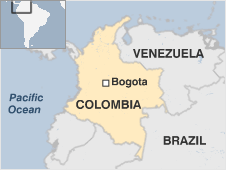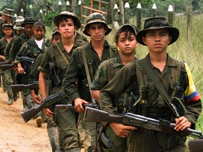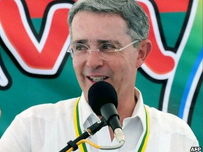Generic Medicines
Taj Pharma is the largest generic pharmaceutical company in India. We hold top positions in different established markets worldwide generics markets..

Colombia has significant natural resources and its diverse culture reflects the indigenous Indian Spanish and African origins of its people.
 |
But it has also been ravaged by a decades-long violent conflict involving outlawed armed groups drug cartels and gross violations of human rights.
The fourth largest country in South America and one of the continent's most populous nations Colombia has substantial oil reserves and is a major producer of gold silver emeralds platinum and coal.
It also has a highly stratified society where the traditionally rich families of Spanish descent have benefited from this wealth to a far greater degree than the majority mixed-race population. With few avenues for social mobility this provided a natural constituency for left-wing insurgents.
AT-A-GLANCE
 Security: A deadly campaign by left-wing Farc rebels continues; right-wing groups are disarming under a peace initiative; the cocaine trade fuels the conflict
Politics: President Uribe is in his second term. He has cracked down on armed groups and is credited with making the cities safer
Economy: Despite strong growth in recent years millions live in poverty; a free trade deal with the US has been signed
International: Colombia is a big recipient of US aid and is a staunch ally of Washington
|
But the lucrative returns from drugs and kidnapping now dominate the rebels' agenda and have largely replaced ideological motivations. Peace talks with the main left-wing rebel group the Farc collapsed in 2002.
At the other end of the political spectrum are illegal right-wing paramilitary groups who are sometimes in the pay of drug cartels and landowners and backed by elements in the army and the police.
Efforts are under way to demobilise the groups which have been particularly active in the north-west where they have targeted human rights workers peasants suspected of helping left-wing guerrillas street children and other marginal groups.
In what was seen as a rare show of unity hundreds of thousands of Colombians staged nationwide protests against kidnapping and the civil conflict in July 2007 demanding the release of some 3000 people still being held hostage by different groups.
Hopes that an end to the decades-long conflict might be in sight were boosted in 2008 by a series of military successes against the Farc rebels as well as the dramatic freeing of several hostages including former presidential candidate Ingrid Betancourt.
Alongside politically-motivated blood-letting is drug-related crime which has become the most common cause of death after cancer and has fuelled kidnapping. Together with the political violence this has made Colombia one of the most violent countries in the world deterring investors and tourists alike.
The US a key market for Colombian cocaine has bankrolled the fight against the trade to the tune of billions of dollars. But critics say "Plan Colombia" has had little impact on the supply and price of drugs.
President: Alvaro Uribe
Alvaro Uribe came to power in May 2002 in a first-round election victory and secured a second four-year term in May 2006.

President Uribe secured a second term with a comfortable victory
|
Described as hard-line and right-leaning he has taken a tough stance against left-wing guerrillas and right-wing paramilitaries alike. Under his presidency the murder rate and the incidence of kidnapping have fallen.
Although this has won him high approval ratings guerrilla attacks on civilians have continued. Mr Uribe said he needs another term to implement his tough policies.
He has boosted spending on the military and police and has set about arming peasants in vulnerable areas. Major offensives have been launched against the guerrillas. Anti-terrorism laws have expanded the military's power to arrest and detain suspects.
In a bid to disarm the paramilitaries his government has held formal peace talks with far-right warlords.
Mr Uribe is keen for international mediation to end the violence.
But an initiative for Venezuelan President Hugo Chavez to get involved in negotiations ran into trouble in late 2007 following a series of diplomatic incidents and lapses of protocol.
Relations between the two presidents became decidedly frosty and deteriorated further in early 2008 after Mr Uribe rejected Mr Chavez's call for Colombia's left-wing rebels to be treated as insurgents instead of terrorists.
Fences began to be mended after the freeing of the Farc's most high-profile hostage Ingrid Betancourt in July 2008.
The Colombian president is Washington's chief ally in a left-leaning region where the Bush administration is not popular.
Born in Medellin in July 1952 Alvaro Uribe is a Harvard and Oxford University-educated lawyer. He is described as a workaholic and a disciplined scholar. He was elected mayor of Medellin in 1982 and was Antioquia governor between 1995 and 1997.
Mr Uribe is a staunch Roman Catholic and is interested in horses and yoga. He is married with two children.
His father a wealthy landowner was killed when Farc rebels tried to kidnap him. But Mr Uribe - who has himself survived a handful of assassination attempts - says his anger does not influence his policies.
Colombia is one of the most dangerous places in the world for journalists to operate. Media workers face intimidation by drug traffickers guerrillas and paramilitary groups. More than 120 Colombian journalists were killed in the 1990s many for reporting on drug trafficking and corruption.
The media-freedom organisation Reporters Without Borders has denounced armed groups corrupt politicians and drug barons as "enemies of press freedom".
Rebels have used radio to spread their propaganda. One of the main clandestine stations is the Farc-operated La Voz de la Resistencia which the rebel group has described as another battlefront.
Colombia's main commercial media outlets are owned by a handful of large groups. Television is the medium of choice for most Colombians.
The press
Television
Radio
Hundreds of stations are registered with the Ministry of Communications. Among the main networks are:
Radio Cadena Nacional (RCN Radio) - mediumwave (AM) network with many affiliates

AFRICA | ASIA-PACIFIC | AMERICAS | EUROPE | MIDDLEEAST | SOUTHASIA
![]()
![]()
![]()
Mauritania Mauritius Morocco Mozambique Namibia Niger Nigeria Republic-of-congo Rwanda Sao-tome-and-principe Senegal Seychelles Sierra-leone Somalia South-africa Sudan Swaziland Tanzania The-gambia Togo Tunisia Uganda Australia Brunei Burma Cambodia China East-timor Fiji Indonesia Japan Kazakhstan Kiribati Kyrgyzstan Laos Malaysia Marshall-islands Micronesia Mongolia Nauru New-zealand North-korea Palau Papua-new-guinea Samoa Singapore Solomon-islands South-korea Taiwan Tajikistan Thailand The-philippines Tonga Turkmenistan Tuvalu Uzbekistan Vanuatu Vietnam Antigua-and-barbuda Belize Bolivia Brazil Canada Chile Colombia Costa-rica Cuba Dominica Dominican-republic Ecuador El-salvador Grenada Guatemala Guyana Haiti Honduras Jamaica Mexico Nicaragua St-kitts-and-nevis St-lucia Suriname Trinidad-and-tobago Uruguay Venezuela Albania Andorra Armenia Austria Azerbaijan Belarus Belgium Bosnia-hercegovina Bulgaria Croatia Cyprus Czech-republic Denmark Estonia Finland France Georgia Germany Greece Hungary Iceland Ireland Italy Latvia Liechtenstein Lithuania Luxembourg Macedonia Malta Moldova Monaco Montenegro Norway Poland Portugal Russia San-marino Serbia Slovakia Slovenia Spain Sweden Algeria Egypt Iran Iraq Israel-and-palestinian-territories Jordan Kuwait Lebanon Libya Mauritania Oman Saudi-arabia Sudan Syria Tunisia United-arab-emirates Yemen Afghanistan Bangladesh Bhutan India Nepal Pakistan Sri-Lanka The-Maldive